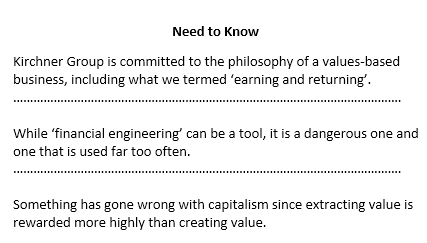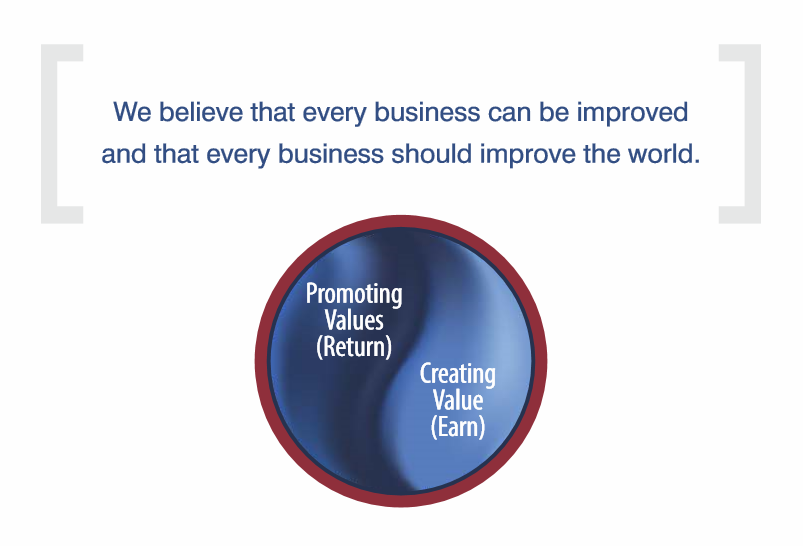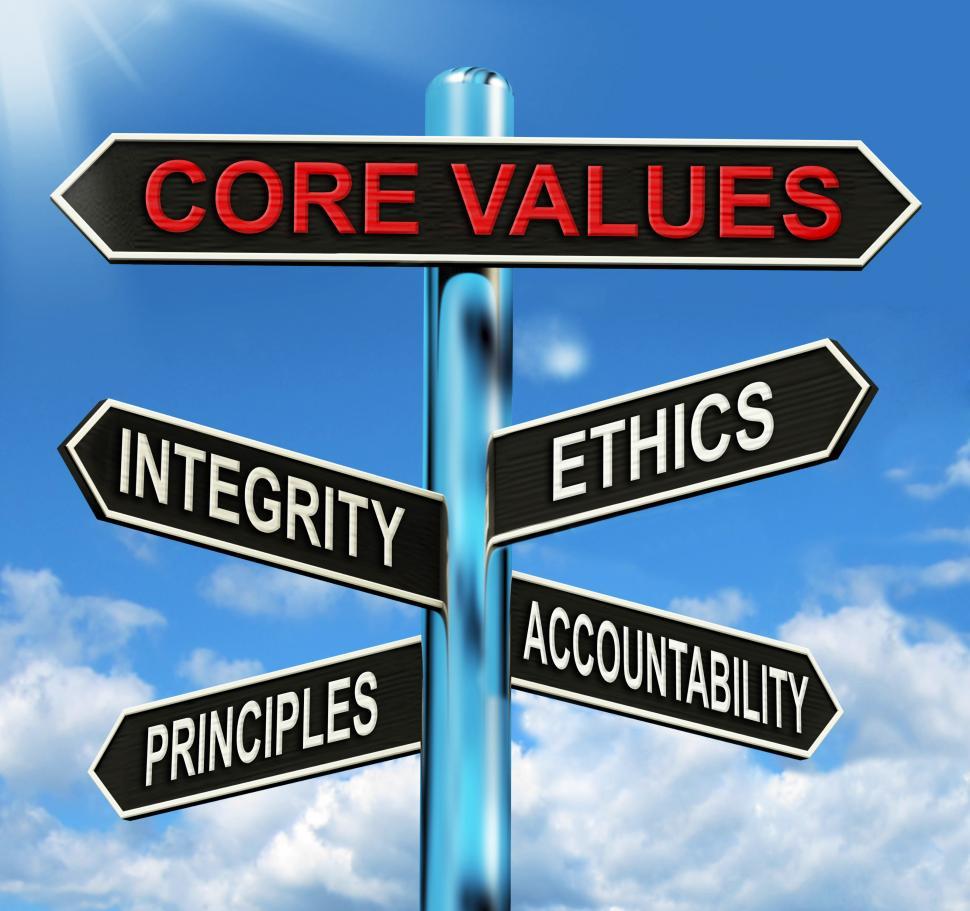Is There Any Explanation for the Way We Act? Part 1: Review of Past Perspectives on Ethics and Values in Business
November 5, 2019 ~ Written by: W.B. “Bud” Kirchner
Approx. Read Time: 12 Minutes
Ethics and Values in Business
In this 2 part series, we planned to report on some recent research related to “civic honesty”. Given its relevance to our (perpetual) theme – namely ethics and values in business – part 1 will recap some other perspectives that have been addressed in earlier articles.
Personal/Corporate Wiring
(There Is A Special Place In Hell For Takers)
“Right is right even if no one is doing it; wrong is wrong even if everyone is doing it.” – Augustine of Hippo
To start, here is a verbatim disclaimer that has been used previously with articles on this theme:
Kirchner Group was founded 35-years ago on what was back then an unusual commitment to the philosophy of a values-based business, including what we termed ‘earning and returning’. This approach has been documented in previous articles and during a PBS interview which was chosen as ‘Interview of the Year’.
To put it another way, our entire team has devoted our careers to creating real value – not using our talents to create the perception of value or short-term versions of value.
We are firm believers in creating value the old-fashioned way (heavy lifting/long term view etc.) In our opinion, while ‘financial engineering’ can be a tool, it is a dangerous one and one that is used far too often.
As described by the PBS Interviewer:
“Acting with values contrary to the sophisticated and terrible financial engineering” – Bob Scully
Historical Context
(Makers & Takers: Why Can’t We Get This Right)
“A cynic is a man who knows the price of everything but the value of nothing.” – Oscar Wilde
Mariana Mazzucato (#6) maintains: “As recently as the 1970s economists viewed financial institutions as merely transferring existing wealth rather than creating new wealth.” Her premise is that something has gone wrong with capitalism since extracting value is rewarded more highly than creating value.
“Until the mid-19th century,” Mazzucato writes, “almost all economists assumed that in order to understand the prices of goods and services, it was first necessary to have an objective theory of value, a theory tied to the conditions in which those goods and services were produced, including the time needed to produce them and the quality of the labor employed; and the determinants of ‘value’ actually shaped the price of goods and services. Then, this thinking began to go in reverse. Many economists came to believe that the value of things was determined by the ‘market’—or in other words, what the buyer was prepared to pay. All of a sudden, value was in the eye of the beholder. Any goods and services being sold at an agreed market price were by definition value-creating.”
Steven Pearlstein, a Pulitzer Prize-winning business and economics columnist for the Washington Post has reflected on how we got here: (#8)
“Thirty years ago, in the face of a serious economic challenge from Japan and Europe, the United States embraced a form of free-market capitalism that was less regulated, less equal, more prone to booms and busts. Driving that shift was a set of useful myths about motivation, fairness and economic growth that helped restore American competitiveness. Over time, however, the most radical versions of these ideas have polarized our politics, threatened our prosperity and undermined the moral legitimacy of our system.”
Pearlstein (#8) references: “A recent survey found that only 42 percent of millennials support capitalism.”
He then goes on to identify the five “myths about capitalism” that got us into this situation:
- “Greed, a natural human instinct, makes markets work.”
- “Corporations must be run to maximize value for shareholders.”
- “Workers’ pay is an objective measure of economic contribution.”
- “Equality of opportunity is all people need to climb the economic ladder.”
- “Making the economy fairer will make it smaller and less prosperous.”
“The real measure of your wealth is how much you’d be worth if you lost all your money.” – Author Unknown
Empirical Evidence
(Two Steps Forward – One Step Back)
“They who are of the opinion that Money will do everything, may very well be suspected to do everything for Money”. – George Savile, Complete Works, 1912
One of the best overviews we have come across is Makers and Takers – The Rise of Finance and the Fall of American Business by Rana Foroohar. (#3)
Fooroohar reports the facts as she (and others) see things:
- Rather than funding the new ideas and projects that create jobs and raise wages, finance has shifted its attention to securitizing existing assets (like homes, stocks, bonds and such), turning them into tradeable products that can be sliced and diced and sold as many times as possible.
- How did finance, a sector that makes up 7 percent of the economy and creates only 4 percent of all jobs, come to generate almost a third of all corporate profits in America?
- Virtual enterprises prosper while real ones, with real workers, struggle. Innovation is falling to cash management, long-term to short-term tricks. Risk in the financial system continues to rise, even as risk capital to real businesses declines.
- As a sign we have not figured it out: Every recovery of the post-World War II period has been longer and weaker than before.
- Finance would rather invest in areas like real estate and construction which are far less productive but offer quicker more reliable short-term gains (as well as collateral that can be sold in a crisis or secure ties in boomed times).
- The move from the “retain and reinvest” corporate model “to a down size in distribution” is in large part responsible for a national economy characterized by economic inequality employment instability and diminished innovative capability.
- In 2030, is when the largest demographic group in US history “the baby boomers” will have nearly depleted the social security trust fund. It is also when the older generation X’s will begin to move out of the work and into retirement.
Not a pretty picture!
“If you want to know what God thinks of money, just look at the people he gave it to.” – Dorothy Parker
Behavioral (bio-chemical) Aspects
“It is helpful to think of people as having two fundamental motivations: the desire to see ourselves as honest, good people, and the desire to gain the benefits that come from cheating – on our taxes or on the football field.” – Dan Ariely
You have to be impressed by someone who has mastered the world of a quant and is still interested in behavior. Andrew W. Lo in “Fear, Greed, and Crisis Management: A Neuroscientific Perspective” succinctly describes the context”:
- Monetary gain stimulates the same reward circuitry as cocaine — in both cases, dopamine is released into the nucleus accumbens.
- Similarly, the threat of financial loss activates the same fight-or-flight circuitry as physical attacks, releasing adrenaline and cortisol into the bloodstream, which results in elevated heart rate, blood pressure, and alertness.
- Gains are ultimately unsustainable, and once the losses start mounting, our fear circuitry kicks in and panic ensues, a flight-to-safety leading to a market crash.
All of these aspects are what John Maynard Keynes described as “animal spirits” and has arguably led to 17 banking-related national crises around the globe since 1974, the majority of which were preceded by periods of rising real-estate and stock prices, large capital inflows, and financial liberalization.
Second on the list is Ian Robertson (Bankers and the neuroscience of greed) who we have had the pleasure of meeting in person. It is extremely impressive how seriously he takes this stuff.
Here are a few of his insights:
- Holding power changes brains by boosting testosterone, which in turn increases the chemical messenger dopamine in the brain’s reward systems.
- In too-large doses it can make them egocentric and un-empathic, greedy for rewards – financial, sexual, interpersonal, material.
- It is a feature of these mental modes that even remembering events or facts which run counter to the prevailing mood is hard – hence depressed.
“We judge ourselves by what we feel capable of doing, while others judge us by what we have already done.” – Longfellow
Bibliography
- Benedict Carey – Why the Imp in Your Brain Gets Out
- Alain Cohn, Michel André Maréchal, David Tannenbaum, Christian Lukas Zünd – Civic honesty around the globe
- Rana Foroohar – Makers and Takers – The Rise of Finance and the Fall of American Business
- Kate Gibson –Martin Shkreli: I should’ve “raised prices higher”
- Andrew W. Lo – Fear, Greed, and Crisis Management: A Neuroscientific Perspective
- Mariana Mazzucato – The Value of Everything: Making and Taking in the Global Economy
- University of Michigan – Moral concerns override desire to profit from finding a lost wallet
- Steven Pearlstein – Five myths about capitalism
- Ian Robertson – Bankers and the neuroscience of greed
Relevant Business Brain Model articles:
- Takers – A Result of the Imp of the Perverse – Part 1
- Makers & Takers: Why Can’t We Get This Right
- Two Steps Forward – One Step Back
- Human Nature As A Cause
- Takers” – Adding Another Perspective to the Discussion – A Result of the Imp of the Perverse? Part 1
- There Is A Special Place In Hell For Takers
- Is There Something Wrong with Our Wiring?
- Positioning Between the Poles: Is right really right and wrong really wrong?
- Financialization As A Symptom
- Our Wiring Isn’t Getting Any Better?!?!
- People Based Due Diligence
About the Author: W.B. “Bud” Kirchner is a serial entrepreneur and philanthropist with more than 50 years of business success. He is not a scientist or an academic but he does have a diversified exposure to neuroscience, psychology and related cognitive sciences. Generally speaking, the ideas he expresses here are business-angled expansions of other people’s ideas, so when possible, he will link to the original reference.



